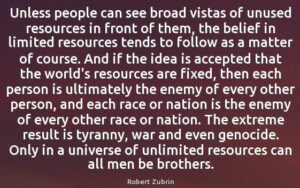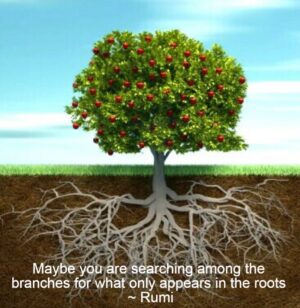Podcast: Play in new window | Download
 The culture… it is invisible.
The culture… it is invisible.
Our culture is also the culture of shortcuts. The culture of quick. The culture of wanting instant. And, of course, the culture of wanting.
What feeds this is the culture of scarcity. We live in the culture of scarcity.
A person needs to see, needs to say that something is not enough. And then they act to fix it.
 Or the culture needs to say something is not enough for the culture to put it on their flag.
Or the culture needs to say something is not enough for the culture to put it on their flag.
And when what motivates you (or the culture) is ‘fixing’ scarcity, you get more scarcity.
Scarcity doesn’t exist in reality. In reality what is is, what isn’t doesn’t even show up. So scarcity is an interpretation. Scarcity is a word. It is a sense. It is not an indicator of anything real, even though it’s a real feeling.
So what is this scarcity that makes people want to fix it. What is this scarcity that makes people run around like a chicken without its head. This scarcity that sends your heart into your throat when I ask you to answer some simple questions. This sense that makes you want to jump to the end of anything, never hanging out, never enjoying anything. Enjoying it even if you don’t quite know what you are doing. You obey a command to go fast… to move on.
I say, that scarcity is a context. A context that says:
Something SHOULD be here, but isn’t. And the fact that it isn’t is, plain and simple, wrong.
The context that makes the eight billion, meaning nearly all people nearly all the time REACT to that context and have nearly ineffective actions, and always ineffective emotions.
The problem with context is this: it is invisible. And unless you are deeper than a puddle, unless you have developed the habit to HONOR and RESPECT the invisible, you will, maybe, intellectually know that there is an invisible, that there is a context. but you’ll not have the intelligence to look what it is, and alter if it is not beneficial to you.
 Context, although it is all powerful, is malleable. It is entirely made up of words. and because it is made up of words, you can, if you know that context is decisive, you can make up words that alter the context. Alter it to be to your benefit.
Context, although it is all powerful, is malleable. It is entirely made up of words. and because it is made up of words, you can, if you know that context is decisive, you can make up words that alter the context. Alter it to be to your benefit.
In Landmark Education it had a technical name. It was called: Conversation for background of relatedness.
It is taught extensively in the Communication Courses. So one would suspect that people who have participated in it would practice it, and become good, or masterful at it.
But they don’t.
 And the issue is that just like the roots of a tree, they DECIDE, they define, they predict the tree that comes from those roots.
And the issue is that just like the roots of a tree, they DECIDE, they define, they predict the tree that comes from those roots.
Your scarcity thinking, your fixing, your ‘wrong’ is in the roots…
Love, harmony, prosperity, cooperation, success cannot come from roots that negate it. Not possible.
The worst at this are probably the people who teach it.
I struggle with it, even though I am good at it, but when push comes to shove, when the rubber hits the road, I am as lousy as anyone.
If you look at the word: context, you can see that it can be and remain invisible, and for the most part it causes unworkability, struggle, animosity, distrust, and fear.
The default context, the context nearly all human have SET early in their lives is that there is something wrong. Something wrong with them. Something wrong with the other, something wrong with the thing they are doing.
And, of course, wrong is a cruel taskmaster. It demands to be fought, it demands to be resisted, it demands to be fixed.
91% of coaching, if it is any good, deals with, addresses the context.
When a coaching client can suddenly see that they are reacting to something that you perceived as a slight, hurt, or any kind of WRONG, and it is not there, they can move to a place of no thing. (That is another word for nothing wrong!!!) And from there they can move to productivity, or cooperation, or love, or compassion, or some greener pastures. Greener than the war zone of them fighting the wrong.
And any interaction in that war zone is an interaction of no fun.
The war zone
I had an interaction in the war zone yesterday. And after a few minutes of the conversation I felt so raw, that I called it quits. I saw that the context now ran away with ‘us’, and we could not save the conversation or the relationship.
I bet you have been in similar situations. Situation that became a shouting match. Situation that escalated maybe even to physical violence. Or situations that ended up in sulking, and pain.
What you probably never considered, and I didn’t either until this morning, that I failed to set a context inside which the same things could be said, and yet the conversation would not turn into war.
Yeah, your ‘master coach’ blah blah blah did a rookie mistake.
I expected the context to be the same as the context we had the last time.
I assumed what the context was going to remain what it was last time.
In family relationships people assume that the context is mutual love…
But any assumption is an expectation of continuity. or permanence. But in reality there is no such thing as permanence. The only thing permanent about reality is that it changes.
So yesterday’s context is just a memory.
The context needs to be set every time, and even inside a conversation, the context needs to be set frequently. Or the situation devolves. And the context returns to the default context, where something is wrong.
 Another word, that makes context more accessible for some people is attitude.
Another word, that makes context more accessible for some people is attitude.
The ‘world’ has reduced attitude to a label, and pulled out people’s power to over their lives.
Attitude is entirely, 100% made up of words. YOUR words. So you have 100% control over what you say, and therefore over your attitude.
And just like with context, attitude is decisive. Because attitude is the exact same thing as context.
In some languages the words say that. Unfortunately English doesn’t. I am going to take some liberties here, but in the Latin original, the word context means: weaving a background, a backdrop against which all is set.
Attitude is a posture in REACTION to the context.
So in the etymology sense, context and attitude are not the same, and yet, when I look, the ONLY thing that can alter the POSTURE is words. Words that change the context.
Wallace D. Wattles wrote an amazing book at the beginning of the 20th Century. An amazing book that he designed, that he intended to change people’s attitude with.
It has been wildly popular, but it has failed to produce the result it could have. It has failed for one reason only: people could not, have not been able to get that their attitude is made up of words. That their attitude is a reaction to a context they don’t even know they have about money, about power, about work.
And unless the context changes, nothing can change.
The mind is entirely under the control of the Ego. Or as Kabbalists say, The Opponent.
And all context comes from the mind. And therefore all attitudes come from the same place.
Wallace D. Wattles talks about the certain way. Unless you get that the certain way is 100% attitude driven, you’ll fail to work, act in that ‘certain way’.
Moreover, if the words you set as your temporary context. A temporary context to give you the attitude that makes things work. But unless you do the deeper work and manage to alter your ‘default context’, you’ll always start from zero. You’ll start from animosity, from powerless, from scarcity.
Most people entirely discount the idea that they have an attitude that is a reaction to a context THEY HAVE.
They haven’t been able to accept that reality is different from what they consider reality.
They insist that the words, the meanings, the narrative they have been adding to the ‘what happened’ is what is robbing them of peace, contentment, love, and a productive life.
They are unwilling to accept that.
One of my clients asked yesterday if he was the student I’d fired the day before. And in a way he was exceptionally astute: he hasn’t been willing to even consider that his ‘personal reality’ is not reality.
When your ‘personal reality’ sits, solidly, on wrong, the only thing you can do is lie, pretend, resist, suppress, and ARGUE and COMPLAIN.
All the good things I talk about sound to you as lies. As consolation. As talking about an impossibility. They take it as a bromide. A trite and unoriginal idea or remark, typically intended to soothe or placate.
Your personal reality is not reality
Because inside your ‘personal reality’ things ARE in a certain way. Which is a way to say: they have nothing to do with you. They are that way because they are that way. Not because you keep saying that they are that way.
So no, I haven’t fired that client. And also I haven’t fired other clients that haven’t even considered that what they say is wrong is not wrong…
So how do you deal with all the ‘wrongs’ you see?
That is a real question.
Because unless you can say, unless you can SEE that wrongs only exist in words, in speaking, and not in reality, there is nothing that I can do for you that will make a difference.
We could say that the human condition is that humans are too arrogant to consider that there is a reality outside of what they say it is.
Arrogance? Yes.
Are all humans arrogant? Yes.
There is only a handful of humans who are willing to consider themselves arrogant and willful and superior, and thus get glimpses beyond that arrogance.
Reality is collective hunch. And the only thing that we can be certain of that is true are numbers. Everything else is just how it seems. And everything else changes with who is the observer.
Once you can get a glimpse, you are humbled.
None of the things you say about yourself, about your husband, about government, about climate change, about the Jews, about anything hold water: they are seemings. All of them.
I am connected to something I could call all-knowledge. I call that something ‘Source’ because it is easy to say. And being connected I can muscletest how accurate ideas, etc. are. But accuracy doesn’t mean truth. Accuracy is always a comparison. Comparing the limited perspective of the human mind (coming from arrogance) and how things actually are, and how being in harmony with how things are, with Life, with Reality a person is, an idea is, an action is.
Learning to set a context, learning to set an attitude
Learning to set a context, learning to set an attitude, can be the difference between living a life of quiet desperation, or living a life that feels like worth living.
The quiet desperation sits on the default context that things are solid, and there is only so much you can do. That you are powerless. You are powerless and it’s not your fault.
Your access to power is words. So you create power with words, and you create powerlessness with words.
The choice is yours.
How you listen, how you hear, how you do anything is against a context that is just below your consciousness.
One of my students has been experimenting with words and is amazed how potently different words change everything. At least temporarily.
Why not forever? Because The Opponent, The Mind, The Ego will never give up. They take over your invented context the moment your awareness goes away, or goes somewhere else.
Definitely while you sleep.
Even though I have been sleeping like a dolphin, with consciousness still awake, and yet every morning I need to set the context: ‘It’s worth it‘. Because when I forget setting that context, I become like everyone else, mired in quiet desperation and in ‘It’s not worth it!!!‘
Half of my business is healing.
I have been able to use some energies that heal or help in healing, help in restoring health.
I have people come to me for help, people whom the energies don’t help, cannot help. Or better said: whom the energies no longer can ‘heal’. But there are other ways to get better, and there are other means.
For some of these people the energies can arrest the growth of what will kill them if the energies used consistently and with the correct attitude. The all or nothing attitude kills more people than anything else.
What is the context of the all or nothing attitude? ‘If I can’t get healthy, I don’t want to do it! It is wrong to be sick!‘ And probably anger: Or desperation. ‘Why is this happening to me?!‘
Some attitude. WORDS. Words can and do kill
Another killer context is either/or. ‘Either I will be healthy or I won’t do it.’
‘Either this can help me to become 100%, or I am not interested.’
Just another way to say all or nothing.
This article was triggered by reading, again, Blair Warren’s book. I write extensively about the book in this article and I even have a free audio there for you.
If you are interested in rooting out the default context you invented that makes your attitude what it is today, you can come to a workshop, or you can do a series of challenges. Workshop is better because it is exact… but it is your choice. Challenges are daily practices, and take you, slowly, to SEEING, to awareness.
